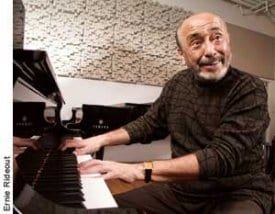Father of Latin Jazz is Back For More With La Perfecta II
 |
Yamaha artist Eddie Palmieri, the father of Latin Jazz, is back with his new CD La Perfecta II. |
"Salsa blasphemy, that's the word I used," says Palmieri, who turns 66 in December. "What they both did in my opinion will never be equaled."
Yet here he is, with a new band, a three-record contract and a new relationship with Yamaha, joining the company's artist roster. Palmieri owns Yamaha pianos in both of his homes: an upright in Puerto Rico and a new C6 conservatory grand piano in the Bronx, NY. "This is the first time I've ever endorsed an instrument, and I'm quite honored," he says.
He's also embarking on something completely new by writing his first Broadway show, to be titled The Bandstand, which will get going in earnest after he records his next studio LP this winter.
 |
Palmieri takes an academic approach to his music, and a vibrant physical approach to his performance.
|
Palmieri, whose career highlights include the self-titled 1964 La Perfecta and 1975's The Sun of Latin Music with its single "Un Dia Bonito," won't say he's on a mission with this new burst of artistic work, but part of his motivation is keeping the flame of Latin jazz for today's young musicians. It's a job he clearly feels needs to be done.
"Our genre is in a terrible state," Palmieri laments. "They have altered the compositions and they have what we call 'la salsa monga' or deadwood salsa minimal or no climax at all. I want to give a lyrical, rhythmic, harmonic oxygen cocktail to the genre, which is desperately needed. Each man in the new band is a sincere student of his instrument. We have that to offer to the young artists."
Whatever his motivation and despite his consistent good humor Palmieri takes this all very seriously, especially rhythm and structure. From surveying today's music he moves seamlessly into an explanation of how Africans use of drums for communication in medieval Spain influenced the Conquistadors' attitude toward Caribbean rhythms centuries later, and how that beat found its way to New York by way of Cuba. "These patterns have been with us now for 40 thousand years," he says.
Schillinger's mathematical approach to music is another influence he embraces, explaining, "Thanks to him, I learned it scientifically: unbalancing axes tension and resistance, like tying a ball to a string, going from inertia to impetus. That's what happens in a composition."
Palmieri stresses the physical demands of playing the piano, and turns to yoga to keep himself limber. "It's technique, its hours of enduring practice," he says. "Tendons, joints, knuckles there's so much to just getting up on the piano. The spinal cord is the brain's filing cabinet, so before a performance I'm on the floor straightening out my spine."
Through his new relationship with Yamaha, Palmieri says he hopes to teach himself some new tricks, especially in the electronic arena. "I want to explore notation software, computers, electronics," he says, adding that he's especially curious about the Yamaha Disklavier® system. "That would be ideal for my European tours," he deadpans: "I could send them the disk, they can send me the check and I can stay home."
All kidding aside, if anything, Palmieri's zeal to perform is growing, and between his scientific approach and four decades at the top of his game, it's not without a little confidence.
"I don't guess I'm gonna excite you with my music," he proclaims. "I know it. I'm gonna get ya."
For more information, write Yamaha Corporation of America, Piano Division, P.O. Box 6600, Buena Park, CA 90622; telephone (714) 522-9011 or email infostation@yamaha.com.
 |
| © 2010 Yamaha Corporation of America. All rights reserved. |
